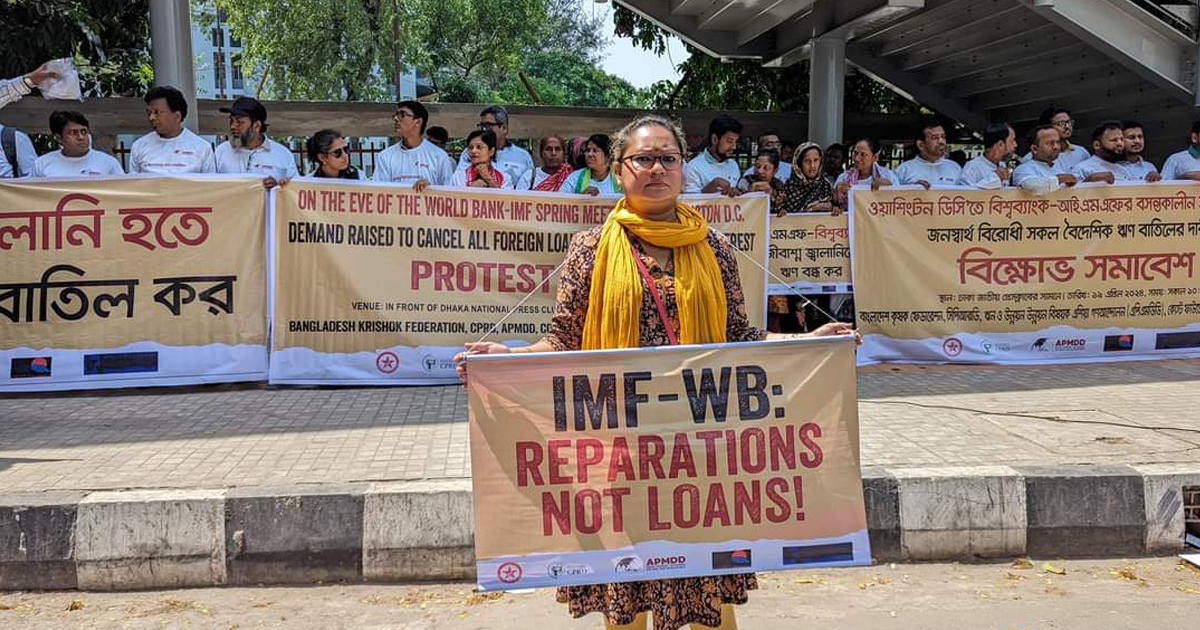This year’s Spring meetings of the IMF and the World Bank have been dominated by the spectre of a deepening crisis in the multilateral world order – indeed, in a BBC interview given before the meetings started, Tunisian economist Fadhel Kaboub referred to the meetings as a “wake for a dying system”.
It’s important to be clear about what this multilateral order is. Walden Bello, for example, describes it as ‘liberal internationalism’ – a project which “sought to make the world safe for US capital through the projection of US military and political power and free trade.” This project is under attack from a far right, isolationist and protectionist Trump administration that had declared among its targets, the institutions which have enabled US power in the post-war period – the IMF and the World Bank. In response the management of both institutions have scrambled to make clear their alignment with aspects of the Trump agenda – gender and climate are off the menu at the IMF as evidenced by the lack of mention in the Managing Director’s curtain raiser, and “forging a global economic landscape ripe for private sector investment” is the main function of the World Bank, according to President Ajay Banga. During the week, the US declared that it would remain a shareholder of both institutions but Treasury Secretary Scott Bessent’s remarks instructed the Fund and Bank to root out ‘mission creep’, again singling out gender, climate and social issues to which the IMF managing director responded in agreement that the IMF had no climate experts.
Global South states were displeased with the level of self-censorship the Fund and Bank are engaging in, even prior to the Spring Meetings. The Bretton Woods Institutions (the IMF and the World Bank Group) and the international financial architecture as currently structured have constrained the ability of Global South states to pursue economic transformation that would enable them to escape cycles of debt, brought about in large part by exogenous shocks. Since 2022, foreign private creditors have extracted nearly $141 billion more in debt-service payments from public-sector borrowers in developing economies than they have disbursed in new financing This is also particularly relevant now, given the race for technical capacity linked to the ‘Green Transition’ which is following an extractivist model.
Among civil society organisations (CSOs), the discussions have been largely focussed on issues of debt in a crucial jubilee year, the continued harms of austerity policies and the likelihood that many countries will face worsening economic fortunes which in turn will deepen a debt crisis which is structural and systemic to the way the global economy functions. It was a muted Springs in terms of Civil Society Policy Forums (CSPFs), as many colleagues were not able to participate due to visa and safety issues, and the official programme was less energetic. There were highlights however, among which were side events and strategy meetings on debt, austerity, the upcoming Fourth Financing for Development Conference (FFD4), and many discussions on how feminists and advocates should navigate the new geopolitical terrain.
Feminists have a systemic critique of the global order as one that is founded on racist, heterosexist, capitalist patriarchy. If we think of austerity, as David Harvey describes, as “accumulation by dispossession” and look at its historical roots and interlinkages with these systems, then we can see that the Trump administration is both a continuation and an intensification of a project that has long been fundamental to the functioning of US and Global North hegemony and consequently the Bretton Woods Institutions (the IMF and the World Bank). As Kate Aronoff argues, that should intensify calls to challenge US dominance of the international financial architecture and the role of the Bretton Woods Institutions, in which the unequal distribution of shareholder power enables the continued dominance of Global North economic and political interests.
It is vital therefore that civil society does not retreat from its systemic critiques of the IMF and World Bank Group, or seek to defend their approach to gender equality – which we have fundamental disagreements with. It should also lead us to strengthen a feminist structural analysis of debt and austerity, and engage in advocacy which builds coalitions that seek to curtail the IMF’s power to enact harmful policies – primarily through conditionality.
The Italian Marxist Antonio Gramsci wrote, “the old world is dying, and the new world struggles to be born; now is the time of monsters.” As feminists, our task is not to uphold the structures that continue to rob billions of people of their rights, dignity, and freedom, but to strengthen in whatever ways that are possible, our collective ability to resist both the monsters and the system that gives rise to them. Given that the world’s pressing problems require multilateral cooperation, that means focusing our strategy on multilateral spaces such as FfD4 as loci for action in an effort to construct a new system.

Tara Povey is the Gender Equality and Macroeconomics Project Lead at the Bretton Woods Project


